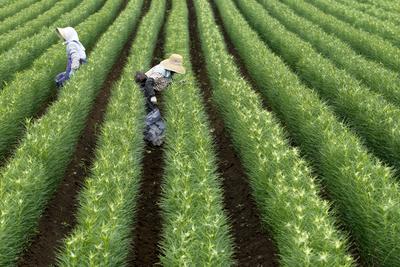The current program of universal farm-income support preserves the existing structure of agriculture by providing incentives to keep inefficient small-scale farms in business. So if the government avoids the politically difficult decision to cut this program, the existing and new policy will be in conflict. But if the government were to use farm-income support as an instrument of structural reform, by providing subsidies only to larger-scale farms, then this would be a powerful step in the right direction.
So far, direct income subsidies for farmers have been a baramaki (pork barrelling) policy to win the votes of farmers, the majority being small-scale producers, with 80 per cent managing two hectares or less. This is unlikely to change, particularly with former LDP nōrin zoku Michihiko Kano in charge of the Ministry of Agriculture, Forestry and Fisheries (MAFF). His political instincts are perfectly attuned with those of the MAFF — maximise government spending on agriculture and preserve the handout mentality of subsidy-dependent farmers that pervades the industry. These attitudes and associated policies ensure that Japanese agriculture — in the hands of an aging workforce cultivating tiny plots — continues to decline and exhibit very low productivity and international competitiveness. Moreover, the government continues to confuse industry policy for agriculture with social policy for the aged and rural dwellers.
Retaining the current income-support program while liberalising agricultural imports will have serious budgetary implications. Dealing with the consequences of agricultural tariff reductions by supplementing farmers’ incomes will push up the cost of farm-income compensation to enormous levels, adding massively to the fiscal burden on the government — which currently pays about ¥1 trillion (US$12.8 billion) per year in subsidies to farm households.
There are also timing issues. Revitalisation of Japan’s farming sector, the plan’s central theme, is a long-term project. It will take years for the reform measures it advocates — hobbled as they are by internal contradictions in government policy — to work their way through Japan’s farming economy. In the meantime, Prime Minister Noda must deal with the immediate issue of whether or not Japan will join the Trans-Pacific Partnership (TPP) negotiations and the agricultural trade liberalisation implications of any subsequent decision to join the TPP itself. Noda cannot approach urgent policy decisions that demand radical short-term action by offering long-term ‘pie-in-the-sky’, ‘hope-for-the-best’ reform programs that could take years to yield results. Even five years seems too optimistic a timeframe for the reform plan.
The usual suspects are also campaigning against the TPP. The Japan Agricultural Cooperatives’ (JA) vociferous anti-TPP campaign is all about protecting the organisation’s own interests — not the farmers. Its profits on high-priced farm inputs such as fertilisers and pesticides are at stake, as are its marketing commissions on high-priced agricultural products (which are a percentage of the selling price). JA represents yet another layer of expensive agricultural bureaucracy in Japan, financially burdening the agricultural sector and blocking all kinds of economic efficiencies for producers.
Moreover, anti-TPP groups are mounting a campaign of disinformation, taking advantage of widespread ignorance and uncertainty about what might be required of Japan if it did join the free trade group. Scare-mongering and extremist rhetoric is common. The Vice-Chairman of JA-Zenchu, Mitsuo Murakami, recently argued that participating in the TPP would lead to people committing suicide. Kano’s predecessor as MAFF Minister, Masahiko Yamada, now chairman of the anti-TPP DPJ Diet members’ league, has also proclaimed he is putting his life on the line to prevent Japan from participating in the TPP. And the rhetoric is getting through: 97 DPJ Diet members signed a petition against joining the TPP, including the DPJ’s first MAFF Minister, Hirotaka Akamatsu. More than two-thirds are first-term Diet members whose electoral prospects are the shakiest.
On top of this, Noda has given a stronger voice to TPP opposition in his own party by strengthening the role of the DPJ’s (anti-TPP) Policy Affairs Research Council and separating it from the executive. This has allowed the group to become the same kind of ‘veto point’ that the internal LDP agricultural lobby used to be. The key difference between Japan’s current and earlier debates on trade liberalisation is that the voice of corporate Japan — which in the past, fearful of challenging the sacred cow of agriculture, went unheard or muted — is now loud and forceful. Whether it will predominate remains to be seen.
Aurelia George Mulgan is Professor at the University of New South Wales, Australian Defence Force Academy, Canberra.

